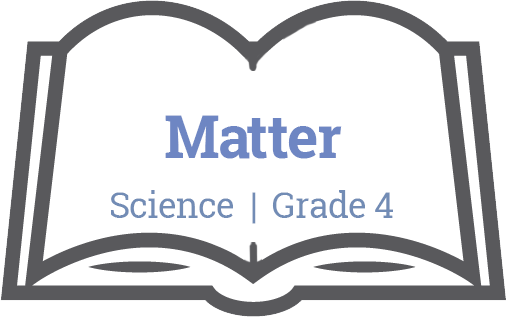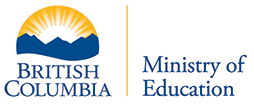
Unit Plan: Matter
Science / Grade 4

Big Ideas
Matter has mass, takes up space, and can change phase.
Concepts:
- Matter
- Phase change
Essential Questions
Students will keep considering…
Overarching Essential Question
- What role does matter have in the universe?
Topical Essential Questions
- PART A: How are observations different from inferences?
- PART B: In what ways can matter be classified?
- PART C: In what ways might matter change state?
As an overview or if you wish to combine the units in Grade 4 Science, an overarching essential question to consider:
- In what ways might matter and energy have a role in the universe?
Evaluative Criteria
Teacher Evaluative Criteria:
Overall Criteria for Rubric:
Student is able to
- Make predictions based on prior knowledge
- Collect simple data/observations
- Sort and classify materials
- Make simple inferences
- Communicate results
- Compare results with predictions
- Transfer and apply learning to new situations
Mystery Substance Lab Report
Student can demonstrate
- Scientific method is followed accurately
- Clarity of the hypothesis
- Clarity of the procedure
- Quality and thoroughness of the observations
- Clarity and effectiveness of the tables/graphic organizers used to classify data and present findings
- Justification of the classification and inferences/conclusions
- Thoroughness of the journal
The Water Cycle Story
Student can demonstrate
- Accuracy of the molecules in the three states and during phase change in the water cycle
- Quality and thoroughness of the explanations
- Quality of the presentation
Monitoring Progress
Teacher will monitor progress:
- Collect Entrance Slips, Exit Slips, and Science Journal to check for student understanding and student reflections. Teacher can alter lessons according to the level of student understanding.
- Teacher can maintain records using a rubric and anecdotal comments (especially of curricular processes during labs)
- Teacher will provide one-on-one feedback or comments in response to Entrance Slips, Exit Slips, and the Science Journal
Differentiation
To be inclusive of all learners, adaptations and extensions are provided for each lesson in the Learning Events (see each lesson).
Adaptations (See lessons)
Basic facts about the states of matter, explanations of the molecules in the state of matter, and phase changes will be provided with text, visuals, and video links.
In addition, to including hands-on experiences, access to visuals, and technological resources during each lesson.
Also, students may be encouraged to work in pairs/groups to be able to discuss their ideas and brainstorm.
Allow for choice of performance/product: writing, comic, iMovie, oral re-telling, printed on the computer, etc.
Extension (See lessons)
Activities will also be available for students to use time to inquire into questions about matter.
Resources
WEBSITES
PICTURE BOOKS
- Look, Listen, Taste, Touch and Smell: Learning About Your Five Senses by Pamela Hill Nettleton
- What’s the Matter in Mr. Whiskers’ Room? by Michael Elsohn Ross
VIDEOS
- Science for Kids: Measuring Matter Video
- Matter Chatter Video
- Bill Nye the Science Guy S01E08: “Phases of Matter”
- Bill Nye the Science Guy S01E07: “Water Cycle”
USEFUL RESOURCES FOR PLANNING UNIT
- Science Formative Assessment: 75 Practical Strategies for Linking Assessment, Instruction, and Learning by Page Keeley
- Making Thinking Visible by Ron Ritchhart, Mark Church and Karin Morrison (Thinking Routines will be found in here!)
- Grade 7 Science Probe Textbook
- Grade 3-6 Properties and Behaviour: Matter & Energy by Evan-Moor Corp.
- Grade 4-6 Simple Chemistry by Evan-Moor Corp.
Reflection
How will teachers and their students reflect on and evaluate the completed project?
Teacher:
Next time I teach this unit I would…
Allow students to select the short stories that link to Identity.
Student:
My students needed:
Process:
Product:
Content:
Potential Student Misunderstanding:
- Observations and Inferences are not the same thing.
- Matter is not energy.
- Phase changes are physical changes, not chemical changes.
Downloads
Stage 2 – Evidence
Authentic Performance Tasks
AUTHENTIC PERFORMANCE TASK: Assessing for Understanding
Students will be able to demonstrate their understanding by:
GRASPS - Mystery Substance
GRASPS - Life of a Water Droplet
Other Evidence
OTHER EVIDENCE: Assessing for Knowledge and Skills
Students will show they have acquired Stage 1 knowledge and skills by:
FORMATIVE ASSESSMENT
- Science Journal (Self-Reflection; Self-Assessment; Formative Assessment) – See Lessons 1 – 10
- Entrance Slips (Pre-assessment) – See Lessons 1, 3
> See-Think-Wonder – See Lesson 1
> MATTER Acrostic – See Lesson 3
- Exit Slips (Formative Assessment) – See Lessons 1 – 10
> I used to think, and now I think – See Lesson 2
> Why does matter Matter? – See Lesson 3
> Frayer Model for Matter – See Lesson 4
> Matter and the Water Cycle – See Lesson 7
> MATTER Acrostic – See Lesson 10
SUMMATIVE ASSESSMENT
(Teacher may use these examples as formative assessments)
- Ice Cube Experiment Lab Report – See Lesson 8
- Odd One Out for Properties of Matter
> Science Formative Assessment by Page Keeley (p. 144)
> Teacher will provide a T-Chart with a set of words listed on one side under the heading “Which is the Odd One?” and an empty side under the heading “Why it is the Odd One Out?” The students have to describe why one word out of the set of words is the Odd One Out. Examples of sets of words: weight, density, length, colour and length, volume, temperature, mass

The following resources are made available through the British Columbia Ministry of Education. For more information, please visit BC’s New Curriculum.
Big Ideas
The Big Ideas consist of generalizations and principles and the key concepts important in an area of learning. The Big Ideas represent what students will understand at the completion of the curriculum for their grade. They are intended to endure beyond a single grade and contribute to future understanding.
Core Competencies
 Communications Competency
Communications Competency
The set of abilities that students use to impart and exchange information, experiences and ideas, to explore the world around them, and to understand and effectively engage in the use of digital media
 Thinking Competency
Thinking Competency
The knowledge, skills and processes we associate with intellectual development
 Social Competency
Social Competency
The set of abilities that relate to students’ identity in the world, both as individuals and as members of their community and society
Curricular Competencies & Content
Curricular Competencies are the skills, strategies, and processes that students develop over time. They reflect the “Do” in the Know-Do-Understand model of curriculum. The Curricular Competencies are built on the thinking, communicating, and personal and social competencies relevant to disciplines that make up an area of learning.
Additional Resources
First People's Principles of Learning
To read more about First People’s Principles of Learning, please click here.
For classroom resources, please visit the First Nations Education Steering Committee.
